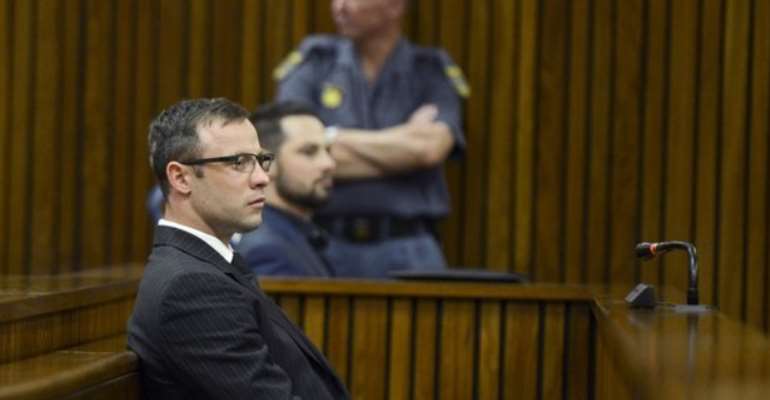Oscar Pistorius Trial: Questions Over Athlete's 'Caring' Image

The prosecution in the Oscar Pistorius case has scrutinised the athlete's charity work, on a second day of his sentencing hearing.
Pistorius's main motive was to further his career, the prosecutor said in an attempt to show he deserves jail for killing his girlfriend Reeva Steenkamp.
The athlete was found guilty of the culpable homicide of Ms Steenkamp last month – but was cleared of murder.
The defence is trying to show prison would be an inappropriate punishment.
It produced a second witness to say Pistorius showed real remorse and his disability would be a problem in jail.
On Monday, the prosecutor was angered by a call for the sentence to be house arrest and community service.
Prosecutor Gerrie Nel labelled the suggestion as a “shockingly inappropriate” punishment.
Pistorius faces up to 15 years in jail, although Judge Thokozile Masipa may suspend the sentence or impose a fine.
She said the athlete had acted negligently when he shot his girlfriend through a toilet door, but had genuinely thought her to be an intruder.
The sentencing hearing is expected to last several days, with lawyers for Pistorius hoping they can prevent a jail sentence.
Honorary doctorate
Proceedings began with Mr Nel's cross-examination of Pistorius's manager Peet Van Zyl.
At Tuesday morning's session, Mr Nel tried to show that the athlete's honorary doctorate at the UK's Strathclyde University was for his achievements “from a young age”, rather than recent charitable work.
Mr Van Zyl had said that the doctorate was for the athlete's support for prosthetic limb development, but Mr Nel said there was no mention of that in the citation.
And he suggested to Mr Van Zyl that sportsmen often took on charity work for pragmatic reasons.
Later the prosecutor questioned whether Pistorius used his own funds to pay for prosthetics for disadvantaged young people, but Mr Van Zyl insisted that money earned for speaking which he asked to be paid not to himself but to charity was his own funds.
He also asked whether Mr Van Zyl had discussed future plans with the athlete, to which he replied that everything depended on the outcome of the trial.
Defence counsel Barry Roux then continued the line of questioning about Pistorius's motivation for his charity work.
The athlete's manager said that while he had contractual obligations to his sponsors, he was always available for them and never complained.
He also made himself available on other occasions and “went the extra mile” for disabled children, Mr Van Zyl added.
The BBC's Andrew Harding says Mr Nel has been trying to show Pistorius as an obedient, self-interested, corporate client rather than a selfless charity volunteer.
The prosecutor has reminded the court that the relationship between celebrity, charity and business is a quid pro quo, but it is not clear that he has done any more than that, our correspondent adds.
He says the judge's verdict suggests that Mr Nel's aggressive style may not work with her.
The next defence witness was Annette Vergeer, a probation officer who said she was working in a private capacity.
Reading out what she said was an objective report, she said Mr Pistorius should receive a suspended sentence, community work, therapy, and correctional supervision.
Prison would punish him in a way that was not constructive, Ms Vergeer said, adding that he was “extremely broken” and would “only deteriorate” there.
“It is virtually impossible in prison to teach a person how to become a useful member of society, as there is no opportunity to practice these skills,” she said.
“There is also no facility to cater for the accused's disability.”
She said he had showed what she believed to be sincere grief and regret at the crime scene, and subsequent depression.
The Paralympic sprinter had denied murdering Ms Steenkamp after a row on Valentine's Day last year, saying he shot her by mistake.
Ms Steenkamp, a 29-year-old model and law graduate, was hit three times by bullets shot through a toilet door by Pistorius at his home in the capital, Pretoria.
BBC SPORT
